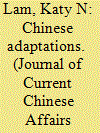| Srl | Item |
| 1 |
ID:
137194


|
|
|
|
|
| Summary/Abstract |
Chinese migrant entrepreneurs in Ghana perceive themselves as vulnerable, as regularly they encounter problems and their businesses fail. The adaption experiences of Chinese entrepreneurs in Africa, especially non-traders, remain largely unstudied. By looking at the interactions of newly arrived and established Chinese migrants with institutional actors, partners, local employees and other Chinese in Ghana, this paper shows the multiple dimensions of how Chinese entrepreneurs’ migration adaptation evolves, and how they create social capital to develop their businesses in Ghana. From the Chinese perspective, established entrepreneurs condemn the recent numerous “new” Chinese in Ghana as part of the root cause of problems, on account of their “poor quality and bad behaviour”; by comparison, the newly arrived Chinese attribute their challenges to deficiencies in the local people and institutions of the host country. The negative experiences of Chinese entrepreneurs in Ghana provide further evidence for, not only African, but also local Chinese agency from below, and suggest that the rising Chinese presence does not necessarily improve the social status of Chinese entrepreneurs or create a stronger, more unified Chinese community on the continent.
|
|
|
|
|
|
|
|
|
|
|
|
|
|
|
|
| 2 |
ID:
134614


|
|
|
|
|
| Summary/Abstract |
Chinese state-owned enterprises (SOEs) have gradually localized their workforce since they began operating in Ghana in the 1980s. Examining their workforce localization patterns, the Chinese SOEs in Ghana appear to be diverse in their business practices and highly autonomous from the Chinese state. Our hypothesis on the substantial autonomy of Chinese SOE overseas subsidiaries, which is consequent to the lack of management control from the Chinese central authority since the Chinese economic reform, contrasts the dominant assumption in the China–Africa debate, in which Chinese SOEs are depicted as closely linked to the Chinese state and/or as the arms of the new Chinese policy in Africa. The workforce localization process of Chinese SOEs in Ghana is largely determined by factors like profit maximization objective, market competition and political pressure. The localization experience is similar to those of Western companies in Africa where complete workforce localization takes a long time to achieve.
|
|
|
|
|
|
|
|
|
|
|
|
|
|
|
|